Impact of Small Businesses on the Economy: An Entrepreneurship Report
VerifiedAdded on 2020/11/23
|9
|2586
|152
Report
AI Summary
This report delves into the multifaceted world of entrepreneurship, exploring diverse venture types and their relationship to entrepreneurial typologies. It examines small business entrepreneurship, scalable start-ups, large company entrepreneurship, and social entrepreneurship, highlighting their unique characteristics and contributions. The report further analyzes the similarities and differences between various entrepreneurial ventures, providing a comparative perspective. A significant portion is dedicated to interpreting relevant data and statistics, illustrating the profound impact of micro and small businesses on the economy, including job creation and innovation. The report also elucidates the role of small businesses and startups in fostering the growth of the social economy, particularly in the context of the UK's economic landscape and the impact of Brexit. The conclusion summarizes the key findings, emphasizing the importance of entrepreneurship and small businesses in driving economic growth and societal development.

Entrepreneurship
and
small business management
and
small business management
Paraphrase This Document
Need a fresh take? Get an instant paraphrase of this document with our AI Paraphraser

Table of Contents
INTRODUCTION................................................................................................................................3
TASK 1.................................................................................................................................................3
P1 Different types of entrepreneurial ventures and manner in which they relate to typology of
entrepreneurship...............................................................................................................................3
P2 Similarities and difference between entrepreneurial ventures....................................................4
P3 Interpret relevant data and statistics to illustrate how micro and small-business impact on the
economy...........................................................................................................................................5
P4 Explain small business and business start ups to growth of the social economy.......................7
TASK 2.................................................................................................................................................7
Covered in PPT................................................................................................................................7
CONCLUSION....................................................................................................................................7
REFERENCES.....................................................................................................................................9
INTRODUCTION................................................................................................................................3
TASK 1.................................................................................................................................................3
P1 Different types of entrepreneurial ventures and manner in which they relate to typology of
entrepreneurship...............................................................................................................................3
P2 Similarities and difference between entrepreneurial ventures....................................................4
P3 Interpret relevant data and statistics to illustrate how micro and small-business impact on the
economy...........................................................................................................................................5
P4 Explain small business and business start ups to growth of the social economy.......................7
TASK 2.................................................................................................................................................7
Covered in PPT................................................................................................................................7
CONCLUSION....................................................................................................................................7
REFERENCES.....................................................................................................................................9
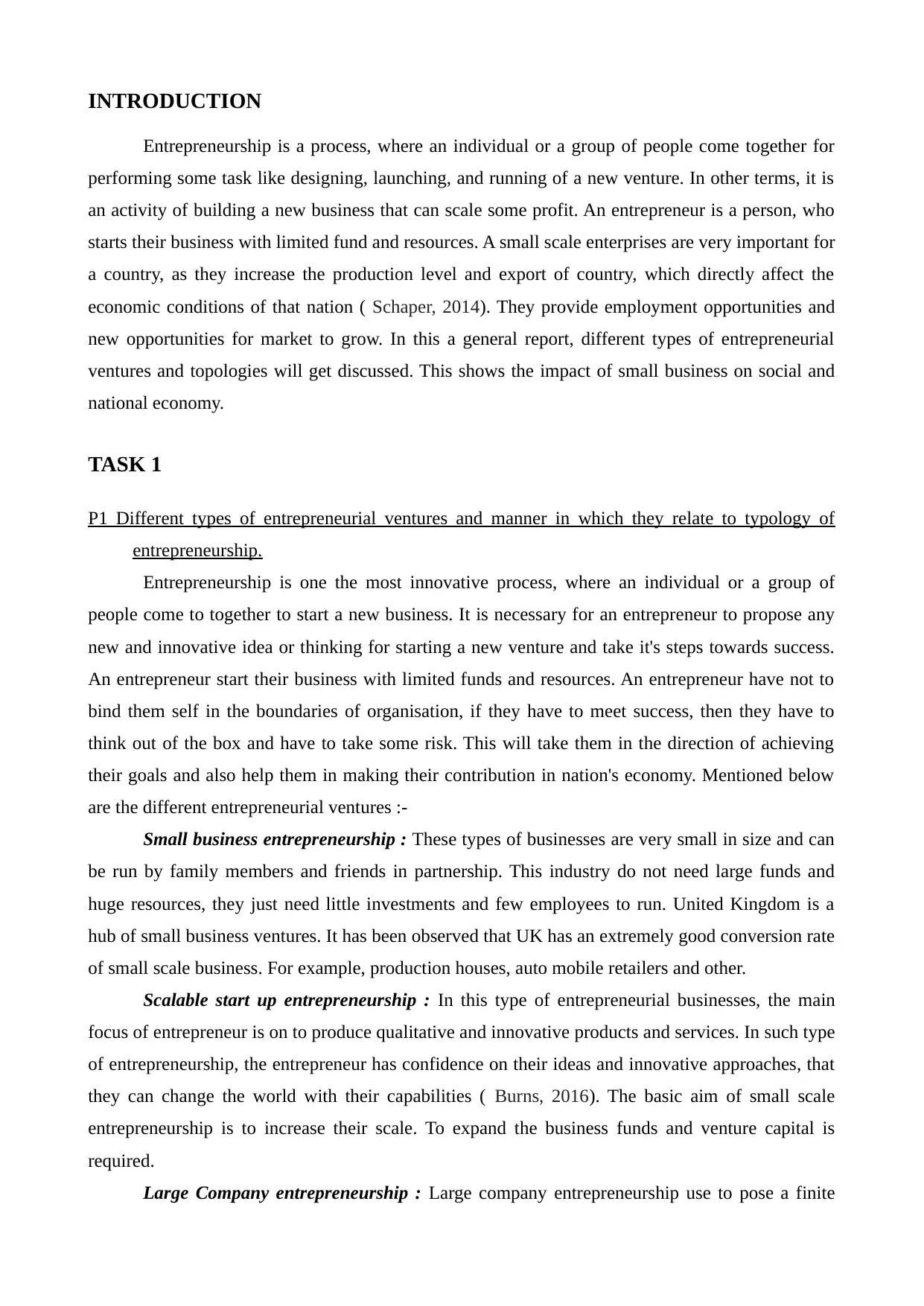
INTRODUCTION
Entrepreneurship is a process, where an individual or a group of people come together for
performing some task like designing, launching, and running of a new venture. In other terms, it is
an activity of building a new business that can scale some profit. An entrepreneur is a person, who
starts their business with limited fund and resources. A small scale enterprises are very important for
a country, as they increase the production level and export of country, which directly affect the
economic conditions of that nation ( Schaper, 2014). They provide employment opportunities and
new opportunities for market to grow. In this a general report, different types of entrepreneurial
ventures and topologies will get discussed. This shows the impact of small business on social and
national economy.
TASK 1
P1 Different types of entrepreneurial ventures and manner in which they relate to typology of
entrepreneurship.
Entrepreneurship is one the most innovative process, where an individual or a group of
people come to together to start a new business. It is necessary for an entrepreneur to propose any
new and innovative idea or thinking for starting a new venture and take it's steps towards success.
An entrepreneur start their business with limited funds and resources. An entrepreneur have not to
bind them self in the boundaries of organisation, if they have to meet success, then they have to
think out of the box and have to take some risk. This will take them in the direction of achieving
their goals and also help them in making their contribution in nation's economy. Mentioned below
are the different entrepreneurial ventures :-
Small business entrepreneurship : These types of businesses are very small in size and can
be run by family members and friends in partnership. This industry do not need large funds and
huge resources, they just need little investments and few employees to run. United Kingdom is a
hub of small business ventures. It has been observed that UK has an extremely good conversion rate
of small scale business. For example, production houses, auto mobile retailers and other.
Scalable start up entrepreneurship : In this type of entrepreneurial businesses, the main
focus of entrepreneur is on to produce qualitative and innovative products and services. In such type
of entrepreneurship, the entrepreneur has confidence on their ideas and innovative approaches, that
they can change the world with their capabilities ( Burns, 2016). The basic aim of small scale
entrepreneurship is to increase their scale. To expand the business funds and venture capital is
required.
Large Company entrepreneurship : Large company entrepreneurship use to pose a finite
Entrepreneurship is a process, where an individual or a group of people come together for
performing some task like designing, launching, and running of a new venture. In other terms, it is
an activity of building a new business that can scale some profit. An entrepreneur is a person, who
starts their business with limited fund and resources. A small scale enterprises are very important for
a country, as they increase the production level and export of country, which directly affect the
economic conditions of that nation ( Schaper, 2014). They provide employment opportunities and
new opportunities for market to grow. In this a general report, different types of entrepreneurial
ventures and topologies will get discussed. This shows the impact of small business on social and
national economy.
TASK 1
P1 Different types of entrepreneurial ventures and manner in which they relate to typology of
entrepreneurship.
Entrepreneurship is one the most innovative process, where an individual or a group of
people come to together to start a new business. It is necessary for an entrepreneur to propose any
new and innovative idea or thinking for starting a new venture and take it's steps towards success.
An entrepreneur start their business with limited funds and resources. An entrepreneur have not to
bind them self in the boundaries of organisation, if they have to meet success, then they have to
think out of the box and have to take some risk. This will take them in the direction of achieving
their goals and also help them in making their contribution in nation's economy. Mentioned below
are the different entrepreneurial ventures :-
Small business entrepreneurship : These types of businesses are very small in size and can
be run by family members and friends in partnership. This industry do not need large funds and
huge resources, they just need little investments and few employees to run. United Kingdom is a
hub of small business ventures. It has been observed that UK has an extremely good conversion rate
of small scale business. For example, production houses, auto mobile retailers and other.
Scalable start up entrepreneurship : In this type of entrepreneurial businesses, the main
focus of entrepreneur is on to produce qualitative and innovative products and services. In such type
of entrepreneurship, the entrepreneur has confidence on their ideas and innovative approaches, that
they can change the world with their capabilities ( Burns, 2016). The basic aim of small scale
entrepreneurship is to increase their scale. To expand the business funds and venture capital is
required.
Large Company entrepreneurship : Large company entrepreneurship use to pose a finite
⊘ This is a preview!⊘
Do you want full access?
Subscribe today to unlock all pages.

Trusted by 1+ million students worldwide
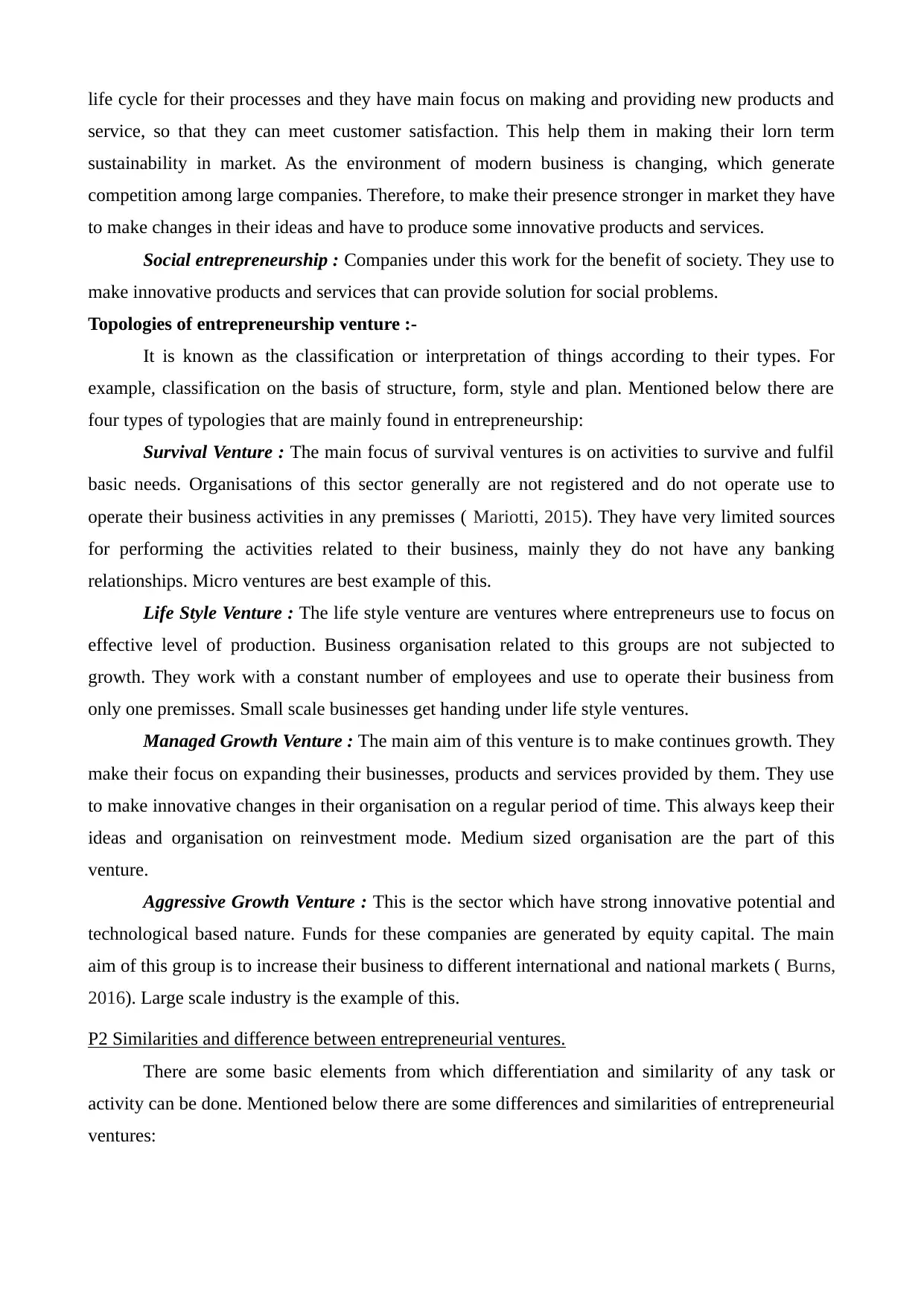
life cycle for their processes and they have main focus on making and providing new products and
service, so that they can meet customer satisfaction. This help them in making their lorn term
sustainability in market. As the environment of modern business is changing, which generate
competition among large companies. Therefore, to make their presence stronger in market they have
to make changes in their ideas and have to produce some innovative products and services.
Social entrepreneurship : Companies under this work for the benefit of society. They use to
make innovative products and services that can provide solution for social problems.
Topologies of entrepreneurship venture :-
It is known as the classification or interpretation of things according to their types. For
example, classification on the basis of structure, form, style and plan. Mentioned below there are
four types of typologies that are mainly found in entrepreneurship:
Survival Venture : The main focus of survival ventures is on activities to survive and fulfil
basic needs. Organisations of this sector generally are not registered and do not operate use to
operate their business activities in any premisses ( Mariotti, 2015). They have very limited sources
for performing the activities related to their business, mainly they do not have any banking
relationships. Micro ventures are best example of this.
Life Style Venture : The life style venture are ventures where entrepreneurs use to focus on
effective level of production. Business organisation related to this groups are not subjected to
growth. They work with a constant number of employees and use to operate their business from
only one premisses. Small scale businesses get handing under life style ventures.
Managed Growth Venture : The main aim of this venture is to make continues growth. They
make their focus on expanding their businesses, products and services provided by them. They use
to make innovative changes in their organisation on a regular period of time. This always keep their
ideas and organisation on reinvestment mode. Medium sized organisation are the part of this
venture.
Aggressive Growth Venture : This is the sector which have strong innovative potential and
technological based nature. Funds for these companies are generated by equity capital. The main
aim of this group is to increase their business to different international and national markets ( Burns,
2016). Large scale industry is the example of this.
P2 Similarities and difference between entrepreneurial ventures.
There are some basic elements from which differentiation and similarity of any task or
activity can be done. Mentioned below there are some differences and similarities of entrepreneurial
ventures:
service, so that they can meet customer satisfaction. This help them in making their lorn term
sustainability in market. As the environment of modern business is changing, which generate
competition among large companies. Therefore, to make their presence stronger in market they have
to make changes in their ideas and have to produce some innovative products and services.
Social entrepreneurship : Companies under this work for the benefit of society. They use to
make innovative products and services that can provide solution for social problems.
Topologies of entrepreneurship venture :-
It is known as the classification or interpretation of things according to their types. For
example, classification on the basis of structure, form, style and plan. Mentioned below there are
four types of typologies that are mainly found in entrepreneurship:
Survival Venture : The main focus of survival ventures is on activities to survive and fulfil
basic needs. Organisations of this sector generally are not registered and do not operate use to
operate their business activities in any premisses ( Mariotti, 2015). They have very limited sources
for performing the activities related to their business, mainly they do not have any banking
relationships. Micro ventures are best example of this.
Life Style Venture : The life style venture are ventures where entrepreneurs use to focus on
effective level of production. Business organisation related to this groups are not subjected to
growth. They work with a constant number of employees and use to operate their business from
only one premisses. Small scale businesses get handing under life style ventures.
Managed Growth Venture : The main aim of this venture is to make continues growth. They
make their focus on expanding their businesses, products and services provided by them. They use
to make innovative changes in their organisation on a regular period of time. This always keep their
ideas and organisation on reinvestment mode. Medium sized organisation are the part of this
venture.
Aggressive Growth Venture : This is the sector which have strong innovative potential and
technological based nature. Funds for these companies are generated by equity capital. The main
aim of this group is to increase their business to different international and national markets ( Burns,
2016). Large scale industry is the example of this.
P2 Similarities and difference between entrepreneurial ventures.
There are some basic elements from which differentiation and similarity of any task or
activity can be done. Mentioned below there are some differences and similarities of entrepreneurial
ventures:
Paraphrase This Document
Need a fresh take? Get an instant paraphrase of this document with our AI Paraphraser
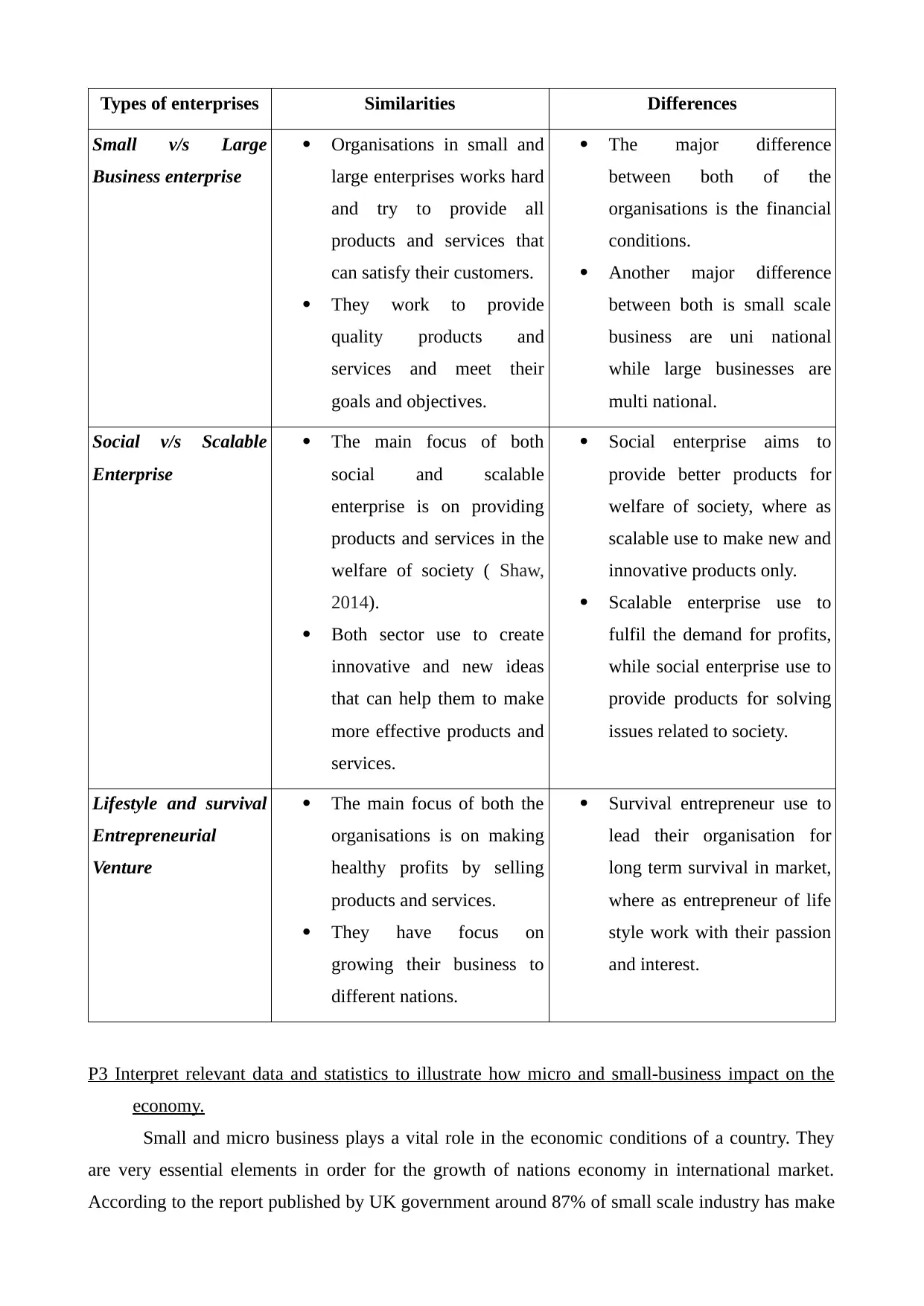
Types of enterprises Similarities Differences
Small v/s Large
Business enterprise
Organisations in small and
large enterprises works hard
and try to provide all
products and services that
can satisfy their customers.
They work to provide
quality products and
services and meet their
goals and objectives.
The major difference
between both of the
organisations is the financial
conditions.
Another major difference
between both is small scale
business are uni national
while large businesses are
multi national.
Social v/s Scalable
Enterprise
The main focus of both
social and scalable
enterprise is on providing
products and services in the
welfare of society ( Shaw,
2014).
Both sector use to create
innovative and new ideas
that can help them to make
more effective products and
services.
Social enterprise aims to
provide better products for
welfare of society, where as
scalable use to make new and
innovative products only.
Scalable enterprise use to
fulfil the demand for profits,
while social enterprise use to
provide products for solving
issues related to society.
Lifestyle and survival
Entrepreneurial
Venture
The main focus of both the
organisations is on making
healthy profits by selling
products and services.
They have focus on
growing their business to
different nations.
Survival entrepreneur use to
lead their organisation for
long term survival in market,
where as entrepreneur of life
style work with their passion
and interest.
P3 Interpret relevant data and statistics to illustrate how micro and small-business impact on the
economy.
Small and micro business plays a vital role in the economic conditions of a country. They
are very essential elements in order for the growth of nations economy in international market.
According to the report published by UK government around 87% of small scale industry has make
Small v/s Large
Business enterprise
Organisations in small and
large enterprises works hard
and try to provide all
products and services that
can satisfy their customers.
They work to provide
quality products and
services and meet their
goals and objectives.
The major difference
between both of the
organisations is the financial
conditions.
Another major difference
between both is small scale
business are uni national
while large businesses are
multi national.
Social v/s Scalable
Enterprise
The main focus of both
social and scalable
enterprise is on providing
products and services in the
welfare of society ( Shaw,
2014).
Both sector use to create
innovative and new ideas
that can help them to make
more effective products and
services.
Social enterprise aims to
provide better products for
welfare of society, where as
scalable use to make new and
innovative products only.
Scalable enterprise use to
fulfil the demand for profits,
while social enterprise use to
provide products for solving
issues related to society.
Lifestyle and survival
Entrepreneurial
Venture
The main focus of both the
organisations is on making
healthy profits by selling
products and services.
They have focus on
growing their business to
different nations.
Survival entrepreneur use to
lead their organisation for
long term survival in market,
where as entrepreneur of life
style work with their passion
and interest.
P3 Interpret relevant data and statistics to illustrate how micro and small-business impact on the
economy.
Small and micro business plays a vital role in the economic conditions of a country. They
are very essential elements in order for the growth of nations economy in international market.
According to the report published by UK government around 87% of small scale industry has make
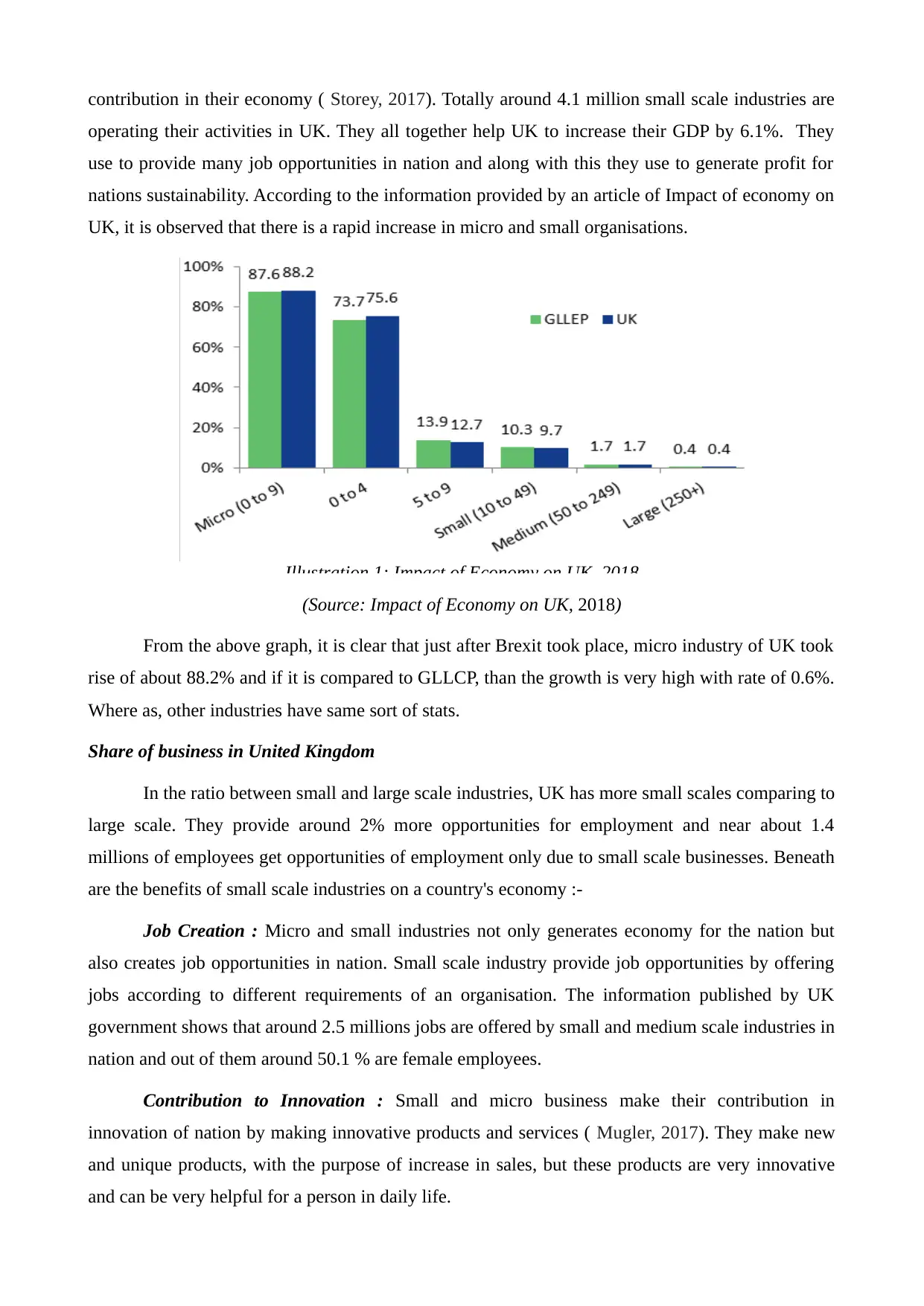
contribution in their economy ( Storey, 2017). Totally around 4.1 million small scale industries are
operating their activities in UK. They all together help UK to increase their GDP by 6.1%. They
use to provide many job opportunities in nation and along with this they use to generate profit for
nations sustainability. According to the information provided by an article of Impact of economy on
UK, it is observed that there is a rapid increase in micro and small organisations.
Illustration 1: Impact of Economy on UK, 2018
(Source: Impact of Economy on UK, 2018)
From the above graph, it is clear that just after Brexit took place, micro industry of UK took
rise of about 88.2% and if it is compared to GLLCP, than the growth is very high with rate of 0.6%.
Where as, other industries have same sort of stats.
Share of business in United Kingdom
In the ratio between small and large scale industries, UK has more small scales comparing to
large scale. They provide around 2% more opportunities for employment and near about 1.4
millions of employees get opportunities of employment only due to small scale businesses. Beneath
are the benefits of small scale industries on a country's economy :-
Job Creation : Micro and small industries not only generates economy for the nation but
also creates job opportunities in nation. Small scale industry provide job opportunities by offering
jobs according to different requirements of an organisation. The information published by UK
government shows that around 2.5 millions jobs are offered by small and medium scale industries in
nation and out of them around 50.1 % are female employees.
Contribution to Innovation : Small and micro business make their contribution in
innovation of nation by making innovative products and services ( Mugler, 2017). They make new
and unique products, with the purpose of increase in sales, but these products are very innovative
and can be very helpful for a person in daily life.
operating their activities in UK. They all together help UK to increase their GDP by 6.1%. They
use to provide many job opportunities in nation and along with this they use to generate profit for
nations sustainability. According to the information provided by an article of Impact of economy on
UK, it is observed that there is a rapid increase in micro and small organisations.
Illustration 1: Impact of Economy on UK, 2018
(Source: Impact of Economy on UK, 2018)
From the above graph, it is clear that just after Brexit took place, micro industry of UK took
rise of about 88.2% and if it is compared to GLLCP, than the growth is very high with rate of 0.6%.
Where as, other industries have same sort of stats.
Share of business in United Kingdom
In the ratio between small and large scale industries, UK has more small scales comparing to
large scale. They provide around 2% more opportunities for employment and near about 1.4
millions of employees get opportunities of employment only due to small scale businesses. Beneath
are the benefits of small scale industries on a country's economy :-
Job Creation : Micro and small industries not only generates economy for the nation but
also creates job opportunities in nation. Small scale industry provide job opportunities by offering
jobs according to different requirements of an organisation. The information published by UK
government shows that around 2.5 millions jobs are offered by small and medium scale industries in
nation and out of them around 50.1 % are female employees.
Contribution to Innovation : Small and micro business make their contribution in
innovation of nation by making innovative products and services ( Mugler, 2017). They make new
and unique products, with the purpose of increase in sales, but these products are very innovative
and can be very helpful for a person in daily life.
⊘ This is a preview!⊘
Do you want full access?
Subscribe today to unlock all pages.

Trusted by 1+ million students worldwide
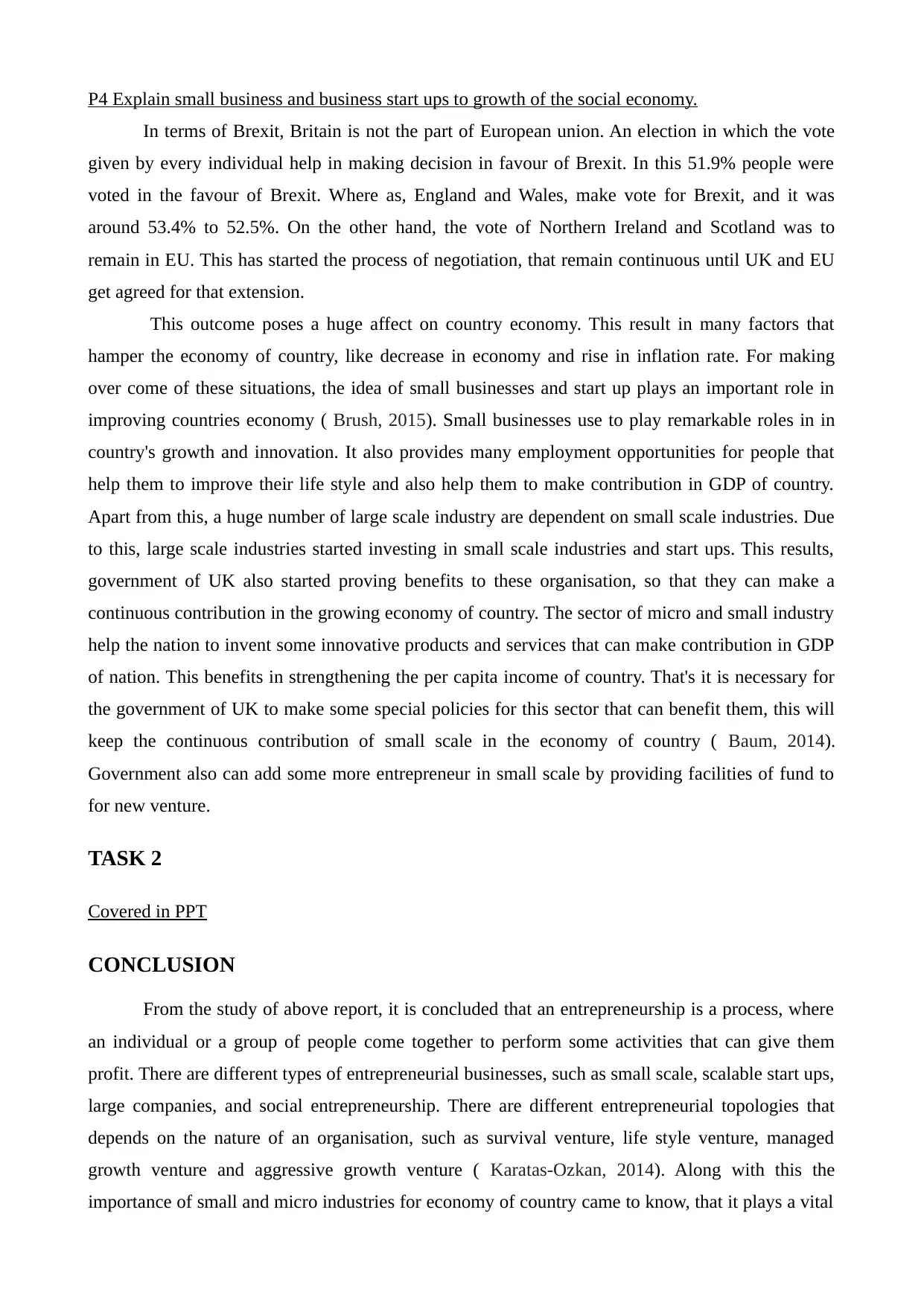
P4 Explain small business and business start ups to growth of the social economy.
In terms of Brexit, Britain is not the part of European union. An election in which the vote
given by every individual help in making decision in favour of Brexit. In this 51.9% people were
voted in the favour of Brexit. Where as, England and Wales, make vote for Brexit, and it was
around 53.4% to 52.5%. On the other hand, the vote of Northern Ireland and Scotland was to
remain in EU. This has started the process of negotiation, that remain continuous until UK and EU
get agreed for that extension.
This outcome poses a huge affect on country economy. This result in many factors that
hamper the economy of country, like decrease in economy and rise in inflation rate. For making
over come of these situations, the idea of small businesses and start up plays an important role in
improving countries economy ( Brush, 2015). Small businesses use to play remarkable roles in in
country's growth and innovation. It also provides many employment opportunities for people that
help them to improve their life style and also help them to make contribution in GDP of country.
Apart from this, a huge number of large scale industry are dependent on small scale industries. Due
to this, large scale industries started investing in small scale industries and start ups. This results,
government of UK also started proving benefits to these organisation, so that they can make a
continuous contribution in the growing economy of country. The sector of micro and small industry
help the nation to invent some innovative products and services that can make contribution in GDP
of nation. This benefits in strengthening the per capita income of country. That's it is necessary for
the government of UK to make some special policies for this sector that can benefit them, this will
keep the continuous contribution of small scale in the economy of country ( Baum, 2014).
Government also can add some more entrepreneur in small scale by providing facilities of fund to
for new venture.
TASK 2
Covered in PPT
CONCLUSION
From the study of above report, it is concluded that an entrepreneurship is a process, where
an individual or a group of people come together to perform some activities that can give them
profit. There are different types of entrepreneurial businesses, such as small scale, scalable start ups,
large companies, and social entrepreneurship. There are different entrepreneurial topologies that
depends on the nature of an organisation, such as survival venture, life style venture, managed
growth venture and aggressive growth venture ( Karatas‐Ozkan, 2014). Along with this the
importance of small and micro industries for economy of country came to know, that it plays a vital
In terms of Brexit, Britain is not the part of European union. An election in which the vote
given by every individual help in making decision in favour of Brexit. In this 51.9% people were
voted in the favour of Brexit. Where as, England and Wales, make vote for Brexit, and it was
around 53.4% to 52.5%. On the other hand, the vote of Northern Ireland and Scotland was to
remain in EU. This has started the process of negotiation, that remain continuous until UK and EU
get agreed for that extension.
This outcome poses a huge affect on country economy. This result in many factors that
hamper the economy of country, like decrease in economy and rise in inflation rate. For making
over come of these situations, the idea of small businesses and start up plays an important role in
improving countries economy ( Brush, 2015). Small businesses use to play remarkable roles in in
country's growth and innovation. It also provides many employment opportunities for people that
help them to improve their life style and also help them to make contribution in GDP of country.
Apart from this, a huge number of large scale industry are dependent on small scale industries. Due
to this, large scale industries started investing in small scale industries and start ups. This results,
government of UK also started proving benefits to these organisation, so that they can make a
continuous contribution in the growing economy of country. The sector of micro and small industry
help the nation to invent some innovative products and services that can make contribution in GDP
of nation. This benefits in strengthening the per capita income of country. That's it is necessary for
the government of UK to make some special policies for this sector that can benefit them, this will
keep the continuous contribution of small scale in the economy of country ( Baum, 2014).
Government also can add some more entrepreneur in small scale by providing facilities of fund to
for new venture.
TASK 2
Covered in PPT
CONCLUSION
From the study of above report, it is concluded that an entrepreneurship is a process, where
an individual or a group of people come together to perform some activities that can give them
profit. There are different types of entrepreneurial businesses, such as small scale, scalable start ups,
large companies, and social entrepreneurship. There are different entrepreneurial topologies that
depends on the nature of an organisation, such as survival venture, life style venture, managed
growth venture and aggressive growth venture ( Karatas‐Ozkan, 2014). Along with this the
importance of small and micro industries for economy of country came to know, that it plays a vital
Paraphrase This Document
Need a fresh take? Get an instant paraphrase of this document with our AI Paraphraser

role in the growth of nation's economy and also provide employment facilities in country.
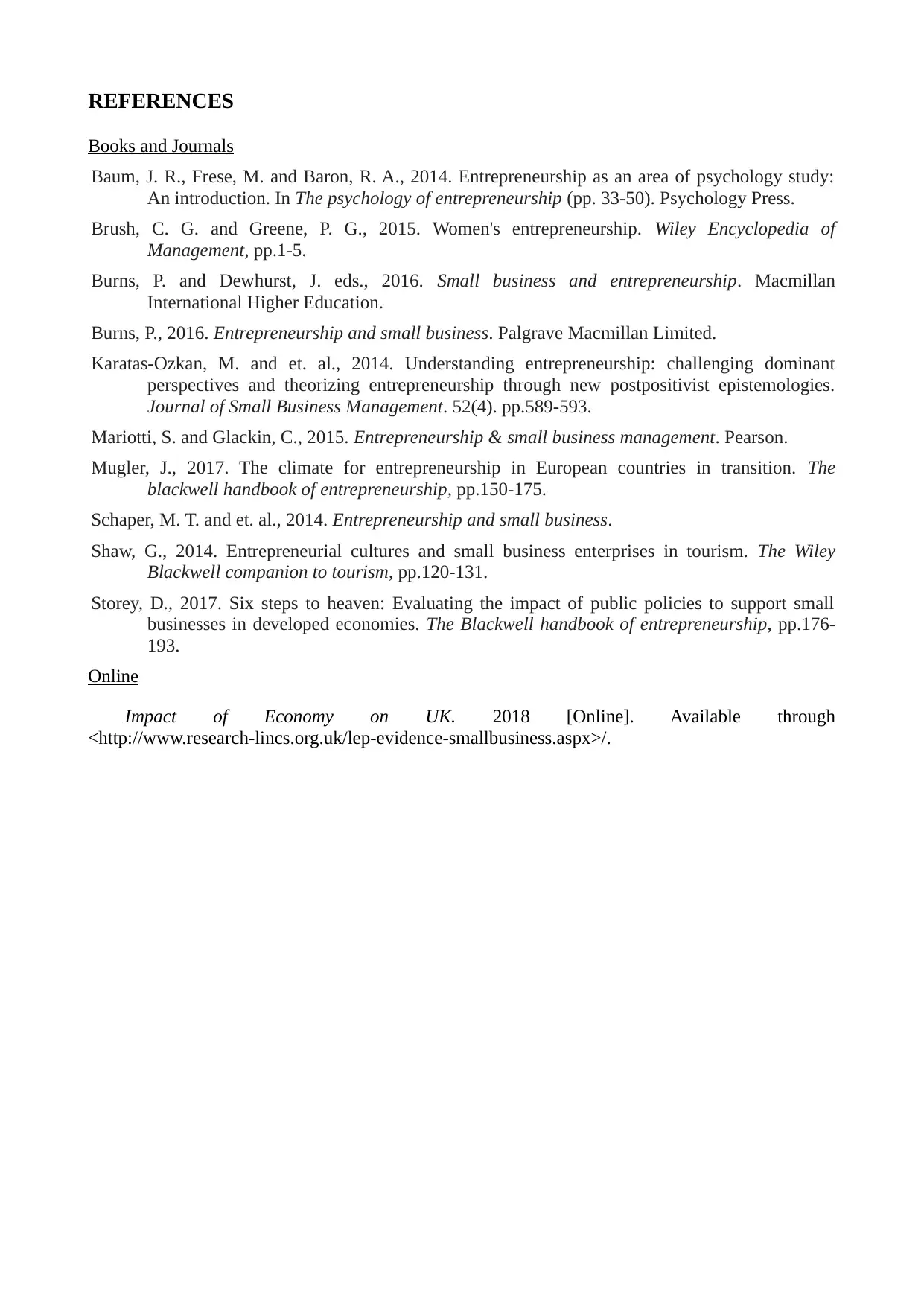
REFERENCES
Books and Journals
Baum, J. R., Frese, M. and Baron, R. A., 2014. Entrepreneurship as an area of psychology study:
An introduction. In The psychology of entrepreneurship (pp. 33-50). Psychology Press.
Brush, C. G. and Greene, P. G., 2015. Women's entrepreneurship. Wiley Encyclopedia of
Management, pp.1-5.
Burns, P. and Dewhurst, J. eds., 2016. Small business and entrepreneurship. Macmillan
International Higher Education.
Burns, P., 2016. Entrepreneurship and small business. Palgrave Macmillan Limited.
Karatas‐Ozkan, M. and et. al., 2014. Understanding entrepreneurship: challenging dominant
perspectives and theorizing entrepreneurship through new postpositivist epistemologies.
Journal of Small Business Management. 52(4). pp.589-593.
Mariotti, S. and Glackin, C., 2015. Entrepreneurship & small business management. Pearson.
Mugler, J., 2017. The climate for entrepreneurship in European countries in transition. The
blackwell handbook of entrepreneurship, pp.150-175.
Schaper, M. T. and et. al., 2014. Entrepreneurship and small business.
Shaw, G., 2014. Entrepreneurial cultures and small business enterprises in tourism. The Wiley
Blackwell companion to tourism, pp.120-131.
Storey, D., 2017. Six steps to heaven: Evaluating the impact of public policies to support small
businesses in developed economies. The Blackwell handbook of entrepreneurship, pp.176-
193.
Online
Impact of Economy on UK. 2018 [Online]. Available through
<http://www.research-lincs.org.uk/lep-evidence-smallbusiness.aspx>/.
Books and Journals
Baum, J. R., Frese, M. and Baron, R. A., 2014. Entrepreneurship as an area of psychology study:
An introduction. In The psychology of entrepreneurship (pp. 33-50). Psychology Press.
Brush, C. G. and Greene, P. G., 2015. Women's entrepreneurship. Wiley Encyclopedia of
Management, pp.1-5.
Burns, P. and Dewhurst, J. eds., 2016. Small business and entrepreneurship. Macmillan
International Higher Education.
Burns, P., 2016. Entrepreneurship and small business. Palgrave Macmillan Limited.
Karatas‐Ozkan, M. and et. al., 2014. Understanding entrepreneurship: challenging dominant
perspectives and theorizing entrepreneurship through new postpositivist epistemologies.
Journal of Small Business Management. 52(4). pp.589-593.
Mariotti, S. and Glackin, C., 2015. Entrepreneurship & small business management. Pearson.
Mugler, J., 2017. The climate for entrepreneurship in European countries in transition. The
blackwell handbook of entrepreneurship, pp.150-175.
Schaper, M. T. and et. al., 2014. Entrepreneurship and small business.
Shaw, G., 2014. Entrepreneurial cultures and small business enterprises in tourism. The Wiley
Blackwell companion to tourism, pp.120-131.
Storey, D., 2017. Six steps to heaven: Evaluating the impact of public policies to support small
businesses in developed economies. The Blackwell handbook of entrepreneurship, pp.176-
193.
Online
Impact of Economy on UK. 2018 [Online]. Available through
<http://www.research-lincs.org.uk/lep-evidence-smallbusiness.aspx>/.
⊘ This is a preview!⊘
Do you want full access?
Subscribe today to unlock all pages.

Trusted by 1+ million students worldwide
1 out of 9
Related Documents
Your All-in-One AI-Powered Toolkit for Academic Success.
+13062052269
info@desklib.com
Available 24*7 on WhatsApp / Email
![[object Object]](/_next/static/media/star-bottom.7253800d.svg)
Unlock your academic potential
Copyright © 2020–2026 A2Z Services. All Rights Reserved. Developed and managed by ZUCOL.

![Entrepreneurship and Small Business Impact Report - [University Name]](/_next/image/?url=https%3A%2F%2Fdesklib.com%2Fmedia%2Fimages%2Fwj%2Fd1f42599211847658d3fd556aa563fa5.jpg&w=256&q=75)



